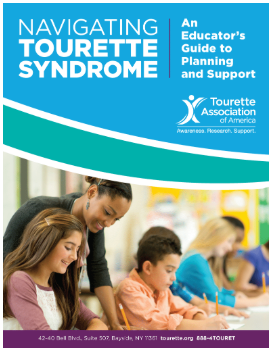At a glance
- Educators and other school personnel can support children with Tourette syndrome (TS) and their families by learning about the condition and providing supportive school environments.
- CDC and its partners provide information about classroom strategies to help students with TS reach their full potential.

Tourette syndrome and the school environment
Tourette syndrome (TS) can affect a child's experience at school. For example, some tics make it difficult to read or write. A child might also get distracted by tics or by trying not to have a tic. In addition, because many people do not understand TS, children are sometimes teased, bullied, or rejected by other kids. However, with some planning, children with TS can have a positive, successful school experience.
Generally, children with TS have the same intelligence range as other children. But problems with tics, often combined with attention deficits and other learning difficulties, can mean that children with TS will need special education assistance. Examples of this type of assistance might include different seating arrangements, additional time for testing or computer accommodations for children who have problems with writing.
Education and training
The Tourette Association of America (TAA) provides information and education that is intended for educators and other school personnel. Following are links to some of this information:
TAA also offers programs that provide information on
- TS and related conditions
- Functional behavioral assessment
- Accommodations
- Behavior support plans or individualized education programs (IEPs)
Prevent bullying
Children with TS and related co-occurring conditions (such as attention-deficit/hyperactivity disorder [ADHD]) are often victims of bullying by their peers. These children might be more of a target because they often stand out from other children, and their tics, obsessions, compulsions, or hyperactivity might single them out from their peers.
Children with tics are more likely to be bullied than children without tics, and those with more severe tics are at even greater risk for being bullied. Among children with tics, bullying has been associated with loneliness and anxiety.1
Bullying can threaten the safety of students and disrupt their ability to learn. School staff can help by addressing bullying or preventing it before it starts.
- Storch, EA, Chase, RM, Keeley, M, Goodman, WK, Murray, M, Geffken, GR. Peer victimization in youth with Tourette's Syndrome and chronic tic disorder: Relations with tic severity and internalizing symptoms. Journal of Psychopathology and Behavioral Assessment. 2007 Dec; 29(4): 211-9.
- ChangeLab Solutions. Developing Positive Disciplinary Strategies to Support Children with ADHD and Tourette Syndrome. Available at: https://www.changelabsolutions.org/product/positive-disciplinary-strategies-children-adhd-tourette?utm_source=ChangeLab+Solutions+Active&utm_campaign=0c815dc553-CMH-School-Disc_Launch_724&utm_medium=email&utm_term=0_-0c815dc553-%5BLIST_EMAIL_ID%5D. Accessed on July 17, 2024.
- Tourette Association of America. Accommodations for Students with Tourette Syndrome. Available at: https://tourette.org/accommodations-for-students-with-tourette-syndrome/. Accessed on June 2, 2025.
- Tourette Association of America. Bullying Prevention & Strategies. Available at: https://tourette.org/about-tourette/overview/living-tourette-syndrome/bullying-issues/. Accessed on June 2, 2025.


